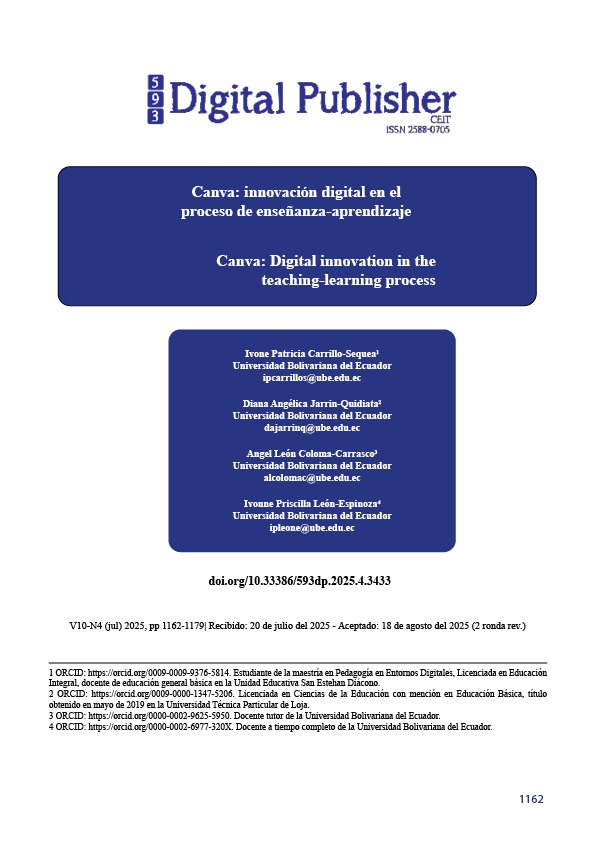Canva: Digital innovation in the teaching-learning process
Main Article Content
Abstract
This article analyzes Canva as a digital innovation tool in the teaching-learning process, highlighting its pedagogical impact from a qualitative and phenomenological perspective. Through a systematic literature review, it identifies and examines recent research that demonstrates how this tool enhances meaningful learning, stimulates creativity, and strengthens fundamental competencies such as critical thinking and collaborative learning.
The research uses a qualitative approach with a phenomenological and descriptive design, based on a systematic literature review of previous studies on the use of Canva in education. To this end, academic databases such as Scielo, Redalyc, Dialnet, and Google Scholar were consulted, using keywords in Spanish and English. The selection included scientific articles, theses, and peer-reviewed papers published between 2021 and 2025. A thematic analysis was then conducted, organizing the information into emerging categories. This allowed for the interpretation and characterization of Canva in the teaching-learning process without direct intervention in the field.
The results show that Canva fosters pedagogical development, motivation, and creativity in learning, transforming traditional teaching practices. However, its implementation requires teacher training and institutional support. Furthermore, further research on its application and comparison with other digital tools is suggested.
Downloads
Article Details

This work is licensed under a Creative Commons Attribution-NonCommercial-ShareAlike 4.0 International License.
1. Derechos de autor
Las obras que se publican en 593 Digital Publisher CEIT están sujetas a los siguientes términos:
1.1. 593 Digital Publisher CEIT, conserva los derechos patrimoniales (copyright) de las obras publicadas, favorece y permite la reutilización de las mismas bajo la licencia Licencia Creative Commons 4.0 de Reconocimiento-NoComercial-CompartirIgual 4.0, por lo cual se pueden copiar, usar, difundir, transmitir y exponer públicamente, siempre que:
1.1.a. Se cite la autoría y fuente original de su publicación (revista, editorial, URL).
1.1.b. No se usen para fines comerciales u onerosos.
1.1.c. Se mencione la existencia y especificaciones de esta licencia de uso.
References
Aguado Moralejo, I. (2021). eXeLearning como herramienta para la virtualización de la enseñanza: el diseño de Objetos de Aprendizaje para el estudio del paisaje urbano. Ikastorratza: e-Revista de Didáctica, 26. https://doi.org/10.37261/26_alea/1
Arcentales Fajardo, M., García-Herrera, D., Cárdenas-Cordero, N., & Erazo-Álvarez, J. (2020). Canva como estrategia didáctica en la enseñanza de Lengua y Literatura. CIENCIAMATRIA, 6(3), 115-138. https://doi.org/10.35381/cm.v6i3.393
Arismendi Bardales, Y. B., Briceño Herrera, J. A., Huamán Aliaga, A. D., & Montes Chávez, Z. H. (2021). Implementación de la herramienta Canva para fortalecer el proceso de enseñanza docente en un colegio de Lima Sur. https://repositorio.isil.pe/handle/123456789/1043
Borja Antrituña, G. M., Chiguano Noboa, M. D., López Fernández, R., & Alzate Peralta, L. A. (2024). Analítica del aprendizaje utilizando la herramienta digital Canva en la asignatura de Estudios Sociales. Revista Metropolitana De Ciencias Aplicadas, 7(Suplemento 1), 165-176. https://doi.org/10.62452/gr3s1240
Cirilo Ramírez, L. E. (2022). La plataforma Canva y el aprendizaje significativo en el área de Ciencias Sociales en estudiantes de secundaria-Distrito del Callao 2022. https://repositorio.ucv.edu.pe/handle/20.500.12692/89634
Collao Castañeda, J. A. E., & Huanca Piahuanti, E. (2024). El uso del CANVA en el aprendizaje significativo en los estudiantes del tercer grado de secundaria de la Institución Educativa Emblemática Daniel Alcides Carrión, 2023. http://repositorio.undac.edu.pe/handle/undac/4934
García Sánchez, O. V. & Lizárraga Reyes, J. (2024). Canva como herramienta educativa: Percepciones y beneficios para estudiantes universitarios. https://doi.org/10.61728/AE24001243
Guamán Tenesaca, B. A. (2023). Herramienta tecnológica Canva y su incidencia en la escritura en el aprendizaje del idioma inglés en los estudiantes de sexto de EGB (Master's thesis, Universidad Nacional de Educación). http://repositorio.unae.edu.ec/handle/56000/3189
Jaya Ushca, L. F., Villacís Tagle, J. A., & Reigosa Lara, A. (2024). Recursos didácticos de enseñanza aprendizaje con ayuda de la gamificación e inteligencia artificial para docentes. MQRInvestigar, 8(2), 2296–2310. https://doi.org/10.56048/MQR20225.8.2.2024.2296-2310
Kocaarslan Gülcan, E. & Riedler Eryaman, M. (2024). Using “canva for education” application with collaborative learning in visual arts lesson: sample activities for teachers. https://doi.org/10.17755/esosder.1371676
Morán Vera, K. D., Villacís-Suárez, C. V., & Alzate-Peralta, L. A. (2025). Estrategia didáctica basada en Canva para mejorar el proceso de enseñanza-aprendizaje en la asignatura de ciencias naturales. MQRInvestigar, 9(1), e192. https://doi.org/10.56048/MQR20225.9.1.2025.e192
Moro Ramos, S. (2024). Canva como herramienta para promover el aprendizaje significativo en la enseñanza del inglés como lengua extranjera. European Public & Social Innovation Review, 9, 1–19. https://doi.org/10.31637/epsir-2024-869
Muñoz E. M., Villacis, H. P., Cobas, R. G., & Cornejo, M. N. (2024). Desarrollo de aprendizaje colaborativo para estudiantes con necesidades educativas especiales: El caso de la herramienta Canva. 593 Digital Publisher CEIT, 9(4), 333-345. https://doi.org/10.33386/593dp.2024.4.2514
Pando Puertolas, G., & Ramos Cruz, A. (2024). Herramienta Canva y desarrollo de las competencias digitales en estudiantes de la Escuela Profesional de Educación de la UNSAAC-2023. https://renati.sunedu.gob.pe/handle/renati/1170186
Piña Ferrer, Lenys Senovia. (2023). El enfoque cualitativo: Una alternativa compleja dentro del mundo de la investigación. Revista Arbitrada Interdisciplinaria Koinonía, 8(15), 1-3. Epub 11 de julio de 2023. https://doi.org/10.35381/r.k.v8i15.2440
Quilca Cualchi, J. E., Vaca Espín, G. A., Bodero Arizaga, L. del C., & Yánez Cando, X. O. (2024). CANVA digital resource to promote teaching creativity during the teaching-learning process. Ciencia Digital, 8(2), 103-117. https://dspaceserver.ube.edu.ec/server/api/core/bitstreams/c212316b-a6b8-48d1-aaf0-41a577dd730d/content
Rodríguez Mina, L., Garces Arce, M. F., Avello Martínez, R., & Gómez Rodríguez, V. G. (2024). Canva as a teaching strategy in cultural and artistic education. A systematic review. Ciencia Digital, 8(2), 64-85. https://doi.org/10.33262/cienciadigital.v8i2.2967
Ruiz Ariza. E. (2022). Canva como Herramienta Tecnológica para el Fortalecimiento de la Comprensión Lectora de los Estudiantes de Tercer Grado de Básica Primaria de la Institución Educativa Corazón de María Sede Lázaro Martínez Olier Cartagena, Bolívar. https://repositorio.unicartagena.edu.co/server/api/core/bitstreams/e6d4ba80-a33a-4761-a9fd-d922db6eda53/content
Ruiz Loor, L. G., & Intriago-Romero, W. I. (2022). El uso de la herramienta tecnológica canva como estrategia en la enseñanza creativa de los docentes de la escuela fiscal lorenzo luzuriaga. Revista científica multidisciplinaria arbitrada YACHASUN-ISSN: 2697-3456, 6(11), 75-90. https://dialnet.unirioja.es/servlet/articulo?codigo=9016210
Vargas Cumbicus, M., Carrión-Ordoñez, J. F., Santamaria-López, T. M., & Tapia-Bastidas, T. (2024). Integración de las herramientas tecnológicas Canva y Padlet para fortalecer el aprendizaje colaborativo en la asignatura de Estudios Sociales. MQRInvestigar, 8(3), 1118–1135. https://doi.org/10.56048/MQR20225.8.3.2024.1118-1135
Vila Tura, L. Márquez Bargalló, C. & Oliveras Prat, B. (2022). Una propuesta para el diseño de actividades que desarrollen el pensamiento crítico en el aula de ciencias. URI: http://hdl.handle.net/10498/28070
Yaule Chingo, M. B., Molina Sabando, M. A., Cofre Casillas, B., Castro Rodríguez, J. del C., Rivera Chichande, M. I., & Guaman Maza, C. de los Ángeles. (2024). Diseñando el futuro: el impacto de CANVA en el proceso de enseñanza - aprendizaje como herramienta para docentes: Designing the future: the impact of Canva in the teaching - learning process as a tool for teachers. Revista Científica Multidisciplinar G-Nerando, 5(2), Pág. 1490 –. https://doi.org/10.60100/rcmg.v5i2.222





